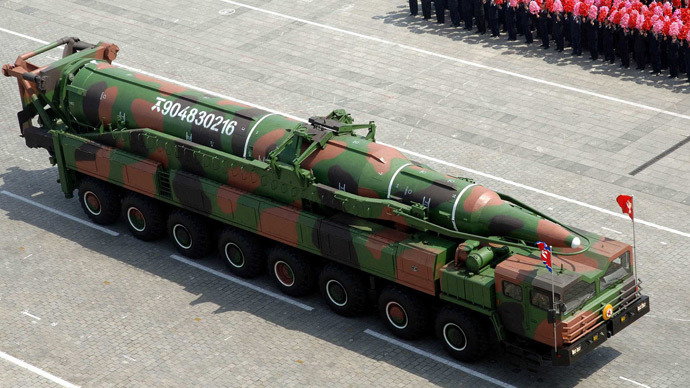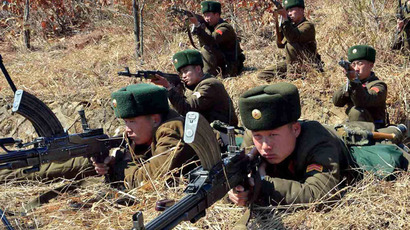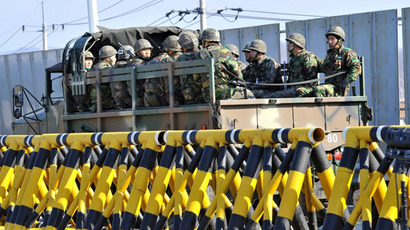‘Consumed in nuclear flames’: N. Korea threatens strike on Tokyo

Pyongyang warned that Tokyo would be its primary target if war broke out on the Korean Peninsula, if Japan maintains its “hostile posture.” It also threatened a nuclear strike against the island nation if it intercepts any North Korean test missiles.
In the comments, carried by the Korean Central News Agency (KCNA) on Friday, Pyongyang lambasted Tokyo’s standing orders to shoot down any North Korean missile heading towards Japan, Seoul-based Yonhap news agency reports. The agency warned that any “provocative” intervention on the part of Japan would see Tokyo “consumed in nuclear flames.”
"Japan is always in the cross-hairs of our revolutionary army and if Japan makes a slightest move, the spark of war will touch Japan first," KCNA warned.
Speaking in Seoul alongside his South Korean counterpart Yun Byung-Se on Friday, US Secretary of State John Kerry said the rhetoric emanating from Pyongyang was “unacceptable.”
Kerry, who arrived in South Korea to kick off a four-day diplomatic tour in East Asia amidst rising tensions in the region, further insisted the international community "are all united on the fact that North Korea will not be accepted as a nuclear power."
"I am here to make it clear today, on behalf of President Obama and the citizens of the United States and our bilateral security agreement, that the United States, will, if needed, defend our allies and defend ourselves."
Kerry continued that any North Korean nuclear missile test would be "a huge mistake."
"If (North Korean leader) Kim Jong-Un decides to launch a missile, whether it's across the Sea of Japan or any other direction, he will be choosing willfully to ignore the entire international community."
"It will be a huge mistake for him to do that because it will further isolate his country," Kerry continued.
His comments mirrored statements made by President Barack Obama,
who met with UN Secretary General Ban Ki-moon in the Oval Office on
Thursday.
"We both agree that now is the time for North Korea to end the
belligerent approach they have taken and to try to lower
temperatures," Obama told reporters.
"It's important for North Korea, like every other country in the
world, to observe basic rules and norms," he continued.

Mounting Tensions
Kerry's visit coincides with the disclosure of a US Defense Intelligence Agency report which says North Korea has the technological know-how to arm a ballistic missile with a nuclear warhead.
The analysis, disclosed at a congressional hearing in Washington on Thursday, was rebuffed by Pentagon spokesman George Little.
Little argued "it would be inaccurate to suggest that the North Korean regime has fully tested, developed or demonstrated the kinds of nuclear capabilities referenced" in the DIA report.
The Director of National Intelligence James Clapper also concluded that the report was not in line with America’s other intelligence agencies.
"Moreover, North Korea has not yet demonstrated the full range of capabilities necessary for a nuclear armed missile," Clapper continued.
On Wednesday, the South Korean military was put on high alert following intelligence reports from Seoul, Tokyo and Washington that a North Korean mid-range missile test could occur at any time.
Pyongyang is expected to launch its untested Musudan missile from its east coast. With a range of 1,800 to 2,180 miles, the missile could hit the Japanese mainland, as well as the Japanese island of Okinawa and the US territory of Guam.
On Friday, Japan announced it would permanently deploy Patriot
missile interceptor batteries on Okinawa, where the United States
currently has a total military deployment of some 50,000
personnel.
Japan had initially planned to station the missile batteries in March 2015, but now hopes to place them on the island later this month. Several other Patriot Advance Capability-3 missile interceptor were deployed throughout Japan during the past week to defend key military units and Tokyo.
The US for its part announced last week that it will soon deploy the Terminal High Altitude Area Defense system (THAAD) to Guam in response to North Korean threats.
The ongoing crisis on the Korean Peninsula was sparked in February, when North Korea conducted its third nuclear test. The launch was condemned by the United Nations and much of the international community, prompting the UN to approve a new round of sanctions in early March.
Pyongyang reacted to the sanctions by threatening to launch a nuclear strike against the US.
In late March, Pyongyang declared it had entered a state of war with its southern neighbor following an earlier decision to withdrawal from the 60-year armistice that ended the Korean War.
North Korea had previously threatened to pull out of the 1953 armistice if the South did not halt a joint annual military exercise with the US.














